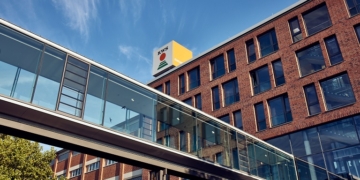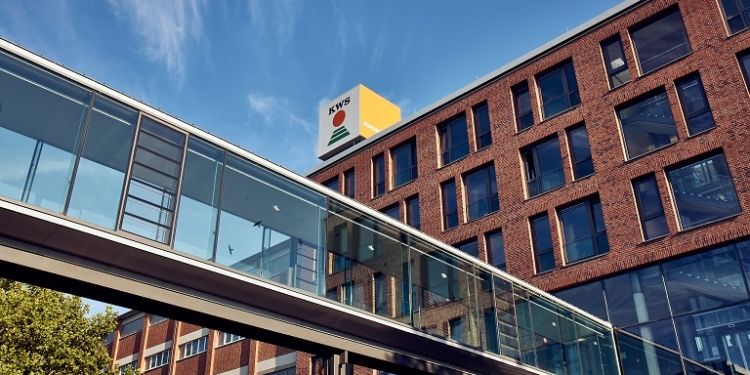Sales increase by 2%, currency–adjusted by 9% – Net income and earnings per share +16% – Higher dividend of € 0.80 per share (PY: € 0.70) proposed – Further growth planned for fiscal year 2021/22
The KWS Group (ISIN: DE0007074007) achieved sales growth of approximately 2% to € 1.31 billion in the 2020/2021 financial year. The key figures EBIT and EBITDA were at the level of the previous year; in contrast, net income and earnings per share recorded a significant increase.
“Our business figures also performed very well last year, enabling us to significantly increase our dividend,” commented Eva Kienle, CFO of KWS. “With our focus on innovative seeds, we score points in established and new markets and thus grow steadily and sustainably. At the same time, we are consistently expanding our digital farming offerings and thus offering our customers additional service. In the new fiscal year, we will continue on this successful path and continue to grow.“
Sales increased by 2.2% to € 1,310.2 (1,282.6) million in the 2020/2021 financial year. On a like-for-like basis (excluding currency effects), sales increased by 8.8%. The operating result before depreciation and amortisation (EBITDA) of the KWS Group improved by 2.4% to € 230.9 (225.5) million. At € 137.0 (137.4) million, the operating result (EBIT) was at the level of the previous year despite planned higher expenses for research & development and significant currency effects.
The financial result improved significantly to € 5.2 (-7.8) million compared to the previous year. In addition to a better interest result of € -12.2 (-18.6) million, a higher investment result of € 17.4 (10.8) million for companies accounted for using the equity method contributed to this. Income taxes amounted to €-31.6 (-34.3) million. This resulted in net income of €110.6 (95.2) million and earnings per share of € 3.35 (2.89).
Free cash flow improved significantly in the reporting period to € 84.2 million (previous year: €31.5 million excluding the acquisition of Pop Vriend Seeds), mainly due to strict working capital management and a more cautious investment policy against the background of the COVID-19 pandemic.
Key figures at a glance
| in € million | 2020/21 | 2019/20 | +/- | |
| Sales | 1.310,2 | 1.282,6 | 2,2% | |
| EBITDA | 230,9 | 225,5 | 2,4% | |
| EBIT | 137,0 | 137,4 | -0,3% | |
| Financial income | 5,2 | -7,8 | – | |
| Result of ordinary activities | 142,2 | 129,5 | 9,8% | |
| Taxes | 31,6 | 34,3 | -7,9% | |
| Year net profit | 110,6 | 95,2 | 16,2% | |
| Earnings per share | in € | 3,35 | 2,89 | 15,9% |
Business development by segment
That Corn segment at € 774.0 million, sales in the reporting year were at the previous year’s level (€ 775.7 million); adjusted for currency effects, the segment recorded an increase of 8.3%. Currency-adjusted growth was mainly driven by the South American markets of Argentina and Brazil and the Europe region. In Europe, especially the high-performance hybrid varieties for grain maize introduced in recent years developed very well, so that we were able to significantly strengthen our market position in this area. In Brazil, the successful commercialization of high-performance hybrid maize varieties significantly expanded the business volume and gained market share. In North America, sales of the AgReliant joint venture declined slightly in a challenging competitive environment. Currency effects from the devaluation of the US dollar against the euro also had a significant negative impact. Segment earnings rose by 6.3% to €71.3 (67.1) million. This was mainly due to higher earnings contributions in North America and Brazil. The segment’s EBIT margin increased slightly from 8.6% to 9.2%.
In Sugar beet segment sales rose by 6.6% to €524.3 (491.8) million due to the growing success of innovative KWS varieties. Demand for CONVISO® SMART continued in the reporting year, with the corresponding grades now available in 25 countries. In addition, first sales were achieved with newly introduced varieties based on a new Cercospora tolerance (CR+). Reseeding due to winter weather in spring 2021 had a positive effect on sales development, especially in France, Germany and the USA. Currency effects, mainly from the ratio of the euro to the US dollar and the Turkish lira, weighed on sales at -6.4%; adjusted for currency effects, the segment recorded an increase of 13.0%. The segment result increased to € 174.7 (170.1) million, while the EBIT margin of 33.3 (34.6)% was slightly below the previous year’s level.
In Grain segment at € 191.2 (191.2) million, sales remained at the previous year’s level; adjusted for currency effects, sales increased by approximately 3%. While the barley seed business declined slightly (5%), mainly due to weather conditions, sales of rapeseed were able to expand (10%) in the wake of higher prices. The wheat seed business also increased by around 10%. Sales of hybrid rye seeds declined slightly against the background of reduced acreage in the EU and adverse currency effects. The segment result declined to €21.3 (26.4) million, mainly due to higher expenses for research and development. The EBIT margin was 11.1%, lower than in the previous year (13.8%).
Sales in the Segment vegetables, which includes the business activities of the acquired vegetable seed company Pop Vriend Seeds, reached € 58.2 million, well below the previous year’s figure (€ 83.5 million). The decline is largely due to lower sales of spinach seeds as a result of the Covid-19 pandemic as well as negative currency effects. The bean seed business, on the other hand, recorded an increase of around 13%. The segment result (adjusted for effects in the context of the purchase price allocation for the acquisition of Pop Vriend Seeds) reached € 7.9 million. Taking into account non-cash effects from the purchase price allocation of inventories measured at fair value (€-4.1 million) and amortization of acquired intangible assets (€ -21.9 million), the segment result was € -18.1 million.
The revenue of the Corporate Segments were € 6.0 (4.6) million. These are mainly generated by KWS’ farms in Germany, France and Poland. Furthermore, the Corporate segment reflects all overarching costs for the central functions of the KWS Group as well as basic research expenses, which is why the segment result is regularly negative. The segment result improved significantly to €-92.0 (-104.6) million, mainly due to positive currency effects from financing instruments and pandemic-related cost savings.
The difference to the Statement of Comprehensive Income of the KWS Group and the segment reporting results from the requirements of the International Financial Reporting Standards (IFRS) and is summarized in the following reconciliation table for the key variables revenue and EBIT:
Reconciliation table
| in € million | Segments | Transfer | KWS Group1 | |
| Sales | 1.553,8 | -243,6 | 1.310,2 | |
| EBIT | 157,2 | -20,2 | 137,0 |
1 Excluding the shares of the equity-accounted companies AGRELIANT GENETICS LLC., AGRELIANT GENETICS INC. and KENFENG – KWS SEEDS CO., LTD.
Investment activity
Against the background of the COVID-19 pandemic, the KWS Group pursued a cautious investment policy in the 2020/2021 financial year, with investments therefore falling to € 81.3 (108.0) million. In the year under review, investment activities followed long-term growth plans with a focus on the establishment and expansion of production, research and development capacities.
Planned appropriation of profits: Significant increase in dividend
Due to the pleasing business development, the Executive Board and Supervisory Board will propose to the Annual General Meeting on December 2, 2021, the distribution of a dividend of € 0.80 (0.70) per share for the 2020/2021 financial year. This would result in a distribution of €26.4 (23.1) million to the shareholders of KWS SAAT SE & Co. KGaA. This would correspond to a payout ratio of 23.9 (24.3)%, with which KWS would continue to pay a dividend of 20 to 25% of the KWS Group’s net income as part of its distribution policy geared to the company’s profitability.
Forecast for the financial year 2021/2022: Further growth expected
Due to a brightening agri-environment with partly significant price increases for agricultural commodities, the Management Board expects an increasing demand for seeds for the 2021/2022 financial year. Sales growth of 5 to 7% is therefore expected for the KWS Group. The EBIT margin is expected to be around 10% and adjusted for non-cash effects from purchase price allocations in the context of corporate acquisitions in a range between 11% and 12%. The research & development ratio should be in a range of 18 to 20%.































